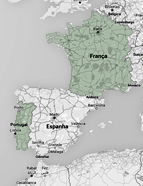

This network of institutions also included the Association pour l'Histoire de la Civilisation, sometimes referred to as the Société Marc Bloch, in memory of the French historian shot during World War II. The presentation of the project on the pages of the Annales featured the principles that would also be shared by the journal and section VI of the EPHE: working in interdisciplinary teams and overcoming traditional research methods. Basically, as stated in this presentation, it was the "spirit of the Annales" that underlay the objectives of the Société Marc Bloch (Annales E.S.C., vol. 2, no.1, 1947, p. 2).
But that was not all. It also alluded to the objective of "spreading French thought", suggesting an expansionist strategy from the outset, through the creation of branches of the Association in different countries. The newcomer, Magalhães Godinho, among the founding members - who included figures such as Lucien Febvre, Fernand Braudel, Maurice Lombard and Charles Morazé - was a response to this objective, and he was immediately met with the proposition of creating a Portuguese branch (Godinho, Do ofício..., p. 59). Although the available information regarding the Société Marc Bloch does not shed light on how successful this expansionist plan was, it is known that contacts were established, as early as the mid-1960s, for the creation of a centre in Naples (Gemelli, Fernand Braudel, p. 198), however whether there were other foreign centres besides the Portuguese project remains unknown.
This expansionist strategy of the "spirit of the Annales" - in his presentation of the Portuguese project, Magalhães Godinho also refers to the "spirit of one Henri Pirenne or Marc Bloch", a narrative on the "memory of origins" that was part of an institutional and promotional strategy developed from the mid-1940s (Gemelli, Fernand Braudel, pp. 152-3) - was also a response to needs arising from the very historiographical principles adopted at the time, namely the need for broader geographical and chronological horizons in the study of the past, which were present, for example, in Fernand Braudel's magnum opus, O Mediterrâneo e o mundo mediterrânico [The Mediterranean and the Mediterranean World] (1949). This required increasingly detailed knowledge of diverse spatial and temporal contexts, only made possible by the deepening of international relations between researchers who would share their collected data and by the expansion of research networks.
